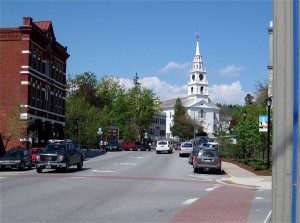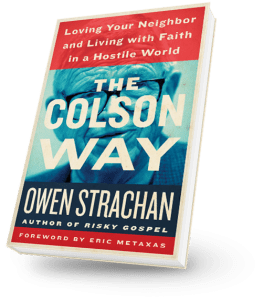 If you’re not reading Houston Baptist University’s The City, you’re missing out, period. This journal now features some of the best commentary on political, cultural, and theological issues that an intelligent reader can find. For example, in the most recent edition, editor Ben Domenech interviews Robby George–not just for a couple paragraphs, but for several pages. Every sentence is worth reading.
If you’re not reading Houston Baptist University’s The City, you’re missing out, period. This journal now features some of the best commentary on political, cultural, and theological issues that an intelligent reader can find. For example, in the most recent edition, editor Ben Domenech interviews Robby George–not just for a couple paragraphs, but for several pages. Every sentence is worth reading.
Read the whole thing online here; sign up to receive a hard copy of The City here (it’s free). And tell someone else about this excellent project. There are essays in this issue on Cormac McCarthy, Steve Jobs, the kingdom of God, and much more.
Domenech’s essay on the “Occupy Wall Street” movement includes a stirring section on British intellectual C.E.M. Joad, who experienced a C. S. Lewis-like redemption. I think Domenech should write a book on Joad:
Joad became a celebrity philosopher of some note, despised by conservatives but a prominent public figure (considered as popular, if not more so, as George Bernard Shaw and Bertrand Russell). He sold books, and speeches, and pacifism, and agnosticism, and socialism. He had scores of mistresses. The opening of a 1944 BBC documentary about his life at home compared him, unironically, to Socrates.
It all came crashing down in an odd, small scandal. In 1948, Joad was caught riding a Waterloo-Exeter train without a ticket. Known to
frequently boast about dodging his fare, Joad was convicted of the offense, and fined £2. It seems strange that so small a thing would be
a national story, but it was an embarrassment to the point that Joad was fired by the BBC, publicly humiliated, his reputation destroyed. Privately, even prior to the scandal, Joad had come to seriously question his earlier beliefs. He drew away from pacifism, and then
socialism, and eventually agnosticism. A key came when he was invited back to the Oxford Union by its president, C.S. Lewis, to speak
to a group on faith and public life. Joad had read Lewis’s latest book, The Abolition of Man, and it had rocked him on a deeper level. He
eventually wrote a book, The Recovery of Belief, making his restored faith public a year before his death from cancer.
“It is because… the religious view of the universe seems to me to cover more of the facts of experience than any other that I have been gradually led to embrace it. I now believe that the balance of reasonable considerations tells heavily in favor of the religious, even Christian view of the world.”
I did a piece on “The Charismatic Question,” examining the ties between charismatic Christians and the evangelical movement (I discussed this with Collin Hansen and Justin Taylor here). I began by talking about the rock group Kings of Leon:
I wonder if in telling the story of a rock band we might find here a metaphor for another American institution, the ironically anti-institutional folk Christianity known as the charismatic movement. Like the haunted Christianity that pervades “Radioactive” and other songs of the Kings of Leon, charismatic faith is woven into the texture of the American experience. Though wildly popular (to say nothing of its massive global influence), the charismatic movement has not represented mainstream American Christianity. Like the old hymn that weaves its way through a decidedly secular song, charismatic Christianity is at once an essential part of the recent American past and a marginalized cultural element, familiar and unknown, widely believed but scarcely understood.
Here is the table of contents for the Winter 2011 edition, which you can read online (and you should also sign up to receive in hard copy):
Faith & Politics
Wilfred McClay on the Cities of God & Man
Russell Moore on the Politics of Dominion
Jordan Ballor on the Common Good
Robert George on Constitution & Creed
Features
Eric Teetsel on Capitalist Evangelism
Benjamin Domenech on the Untrained Grasshopper
Terrence Moore on Steve Jobs & Capitalism
Owen Strachan on the Charismatic Question
Paul D. Miller on The Lessons of Iraq
Books & Culture
Louis Markos on God and Morality
Richard Reinsch on Redeeming Democracy
R.J. Snell on Cormac McCarthy & Sloth
Peter Lawler on The Cloned Soul
A Republic of Letters
Hunter Baker
Poetry by Bill Coyle
The Word by Cotton Mather











